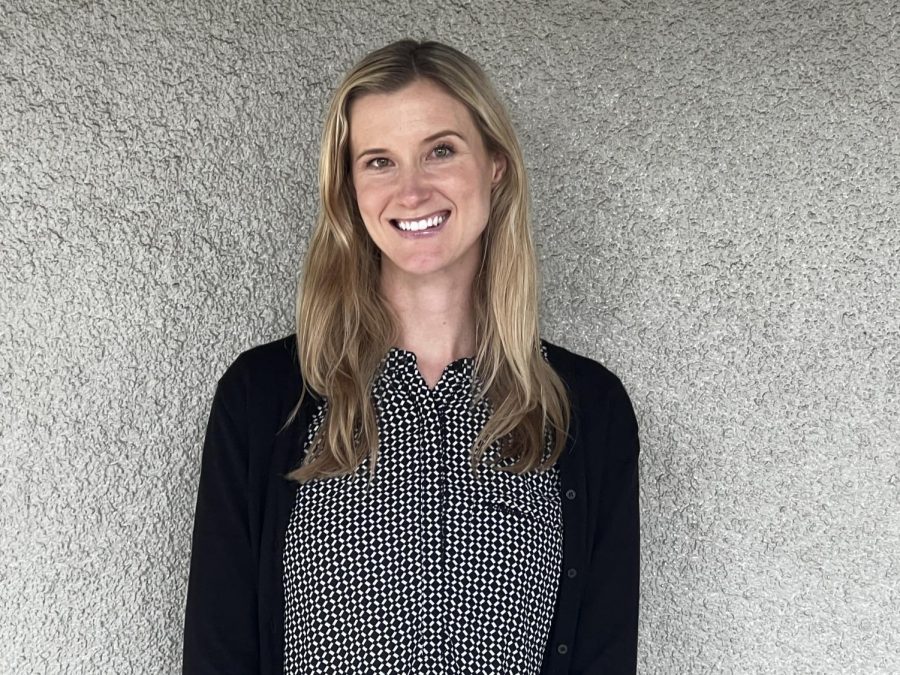New Teacher Feature: Ms. Carlie Jones
December 1, 2021
After a year and a half of remote learning, adapting and readjusting to a structured school schedule and being in the physical presence of other people has certainly been an unusual experience for both students and teachers alike. With the promise of a fresh start back from over a year of minimal social interaction, we welcome the addition of several new teachers to our staff, including Ms. Carlie Jones, who has started her first year teaching Algebra I Collaboration as a Resource Specialist at Arcadia High School (AHS).
Born and raised in Long Beach, California, Ms. Jones enrolled in an undergraduate degree program in UCLA, and later studied special education at California Polytechnic State University, San Luis Obispo before working for four years as an instructional assistant supporting classrooms across Southern California. Ms. Jones also spent a year teaching English overseas in Taiwan after taking up an interest in Asia and Southeast Asia in UCLA.
After finishing her graduate studies in San Luis Obispo, Ms. Jones’ desire to both be closer to the city and to her family in Southern California led her back to the greater Los Angeles area and into AHS. In addition to teaching Algebra I in accordance with California standards, one of Ms. Jones’ main responsibilities in the classroom is implementing “scaffolding instruction”, or developing the curriculum to fit the needs of all different types of learners.
“My job in the classroom is to really think, ‘Okay, what works for our students, what doesn’t work for our students,’ and then support them in their personal educational journeys,” she said.
For example, in addition to taking regular chapter tests to assess their progress in math, Ms. Jones’ students are also currently working on a math project that incorporates art, allowing them to apply their math skills to a different medium. Ms. Jones is also working towards giving her students more ways to collaborate in small groups and build relationships as the school year progresses.
“My feeling is that there’s a lot more variety and additional adult support in the classroom,” she said about teaching Algebra I Collaboration compared to Algebra I. “It’s interesting because you can have the same curriculum and the same standards that we’re working towards, but the way we teach that information can be very unique.”
In addition to her education in special education in college, Ms. Jones also believes that her experience overseas aids her teaching; according to her, being able to teach in a completely different region of the world with a different predominant language and culture gave her further insight into different barriers to learning, an especially important lesson she uses to guide her teaching after the pandemic, when the challenges students face in their learning are further compounded.
“What I always tell myself, and what I see is that no one student learns the same and there’s no right way to learn,” she said. “I feel that as educators, it’s our job to think of what best supports our students’ learning, and it’s our job to work with that student to tailor the instruction to their specific needs.”
“I’m really big on having the student be the front seat driver – it’s their journey, and who am I to say, ‘Oh, this is the only way to learn,’” she continued. “Everyone’s brain processes information differently.”
In accordance with this belief, another one of her biggest priorities as a teacher is to develop relationships with her students, which she sees as “the foundation for everything else”–critical to building a “student-centered classroom” and a learning environment where her students feel “emotionally and mentally and physically safe.”
In fact, despite the many difficulties posed by the pandemic, she has observed that this challenging experience has brought a new “humanness” to the learning environment–a new emphasis on soft skills and everyone’s social and emotional wellbeing–which she sees as a positive change.
“There’s a new sense of gratitude, a new sense of humbleness, and emphasis on who we are as a person,” she said.
Despite the challenges that she faces, both as a teacher in a new environment and as a person emerging from the pandemic, she continues to feel passionate about working with her students and helping them achieve their maximum potential.
“It’s such an important job, and I feel very fortunate to do a job in life that matters–working with students one on one in groups every single day, making relationships with not only students but also their families, and just having that connection to the community,” she said. “And I’m just so grateful. I can’t think of a lot of other jobs that you can leave and think that even on your hardest days.”

